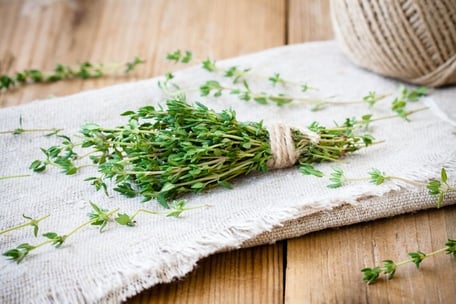
Thyme: More Than Just a Kitchen Staple
More often than not, we associate thyme with the culinary world. This beloved leafy herb complements chicken and other savory dishes. We often think of it as flavoring stuffings, sauces, stews, and soups.
A History Steeped in TraditiThyme’s
Thyme’s legacy stretches beyond the kitchen. Ancient Egyptians used it for embalming. Greeks burned it as incense in temples. During the Middle Ages, people believed its purifying aroma could ward off nightmares. Women often included thyme leaves in parting gifts to knights, symbolizing courage.
Today, thyme remains a favorite in cooking. Bits are gaining recognition for their medicinal and purifying properties.
Why Scientists Are Turning to Nature
About one-third of global deaths are caused by infectious diseases. With antibiotic resistance on the rise, scientists are actively searching for natural alternatives. Plants, including thyme, possess built-in defense mechanisms that protect them against threats such as drought and UV radiation. These same defenses may also benefit us,
The Power of Plant Phenols
Researchers have identified plant phenols that serve as natural antimicrobial agents. Phenols are compounds with an aromatic ring bonded to a hydroxyl group. In common thyme (Thymus vulgaris), two potent phenols—Thymol and carvacrol—stand out. These phenols are also present in oregano, another herb from the mint family.
Thymol: A Time-Tested Antiseptic
Long before modern antibiotics, people used Thymol to medicate bandages. Its antimicrobial properties were first noticed in the food industry. Herbs helped prevent spoilage. Thymol still plays that role today. It preserves meat and enhances oxidative stability in both raw and cooked productIt’st’s even used in Listerine.
When tested against seven common foodborne bacteria and fungthyme’se’s essential oil showed strong antimicrobial and antifungal activity.
Fighting Candida and Other Threats
With drug-resistant Candida strains on the rise, researchers are exploring thymol’s potential as an antifungal agent. Results were promising. Thymol significantly reduced virulence factors like proteinase activity, hemolysis, and biofilm production.
In fact, Thymol reduced virulence by over 70%, making it the most effective against biofilms.
Thymol and Mycotoxin Suppression
Thymol also suppresses aflatoxin production by Aspergillus flavus, a dangerous mold. Aflatoxins can trigger toxic reactions, especially in people with allergies. Although we do not fully understand their impact, researchers have confirmed that Thymol effectively inhibits A. flavus growth and toxin production. This finding strengthens Thymol’s reputation as a potent fungicide.
Thyme’s Potential in Cancer Research
Thyme may also offer anti-cancer benefits. One study found that Thymus vulgaris extract (TVE) slowed the growth of colorectal cancer cells. It also increased apoptotic (programmed) cell death. These results suggest thyme’s bioactive compounds could play a role in future cancer treatments.
Rich in Antioxidants
Beyond its medicinal properties, thyme provides a natural source of antioxidants. These compounds help protect the body from oxidative stress and cellular damage.
Final Thoughts
As you flavor your next dish with thyme, remember:
Time may be of the essence, bthyme’se’s true strength lies in its essence.


